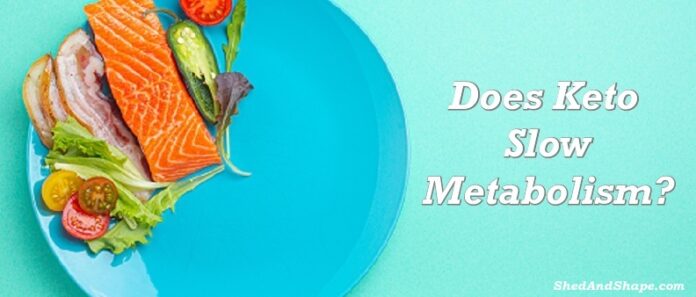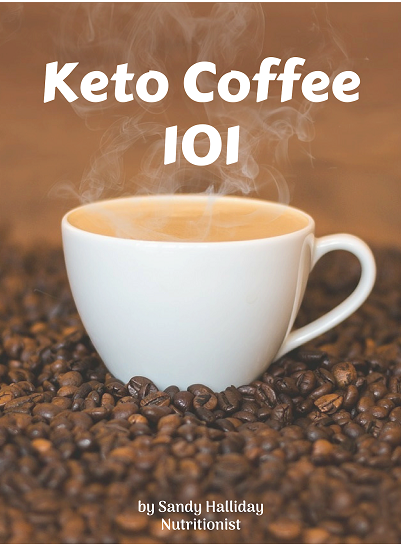Does keto slow metabolism? This is a common question for those thinking of following the keto diet to lose weight. The ketogenic diet is a high fat, low carb diet that aims to put the body into ketosis, and you’ll end up losing weight.
However, some experts argue that all the fats could clog up your body system and mess up your metabolism. When you go back to a normal diet, you could easily gain the weight back and more besides.
To find out more about this, let’s take a look at how the keto diet affects the metabolism and address the question – does keto slow metabolism?
What Is Metabolism?
Metabolism refers to the complex mechanical processes our body uses to function and sustain life. The process includes breaking down foods and drinks to convert them into energy.
Thousands of chemical reactions are taking place inside our bodies to keep our cells healthy and thriving. For our body to function normally, it needs essential nutrients, especially energy, coming from the foods and drinks we consume. The amount of energy that our body burns at a given time is directly affected by our metabolic rate.
Related reading: Lumen Metabolism Tracker Review
Metabolic rate refers to the rate our body utilizes energy to function. Several factors could affect our metabolism, including age, sex, and body size. Our body starts to lose muscles as we age, and our metabolism will slow down.
Men generally burn more energy than women since, in most cases, they have more muscles relative to their total body weight. People who have a larger body size, including muscle mass, are more likely to burn more energy.
Does Keto Slow Metabolism?
There are various misconceptions about how the keto diet affects metabolism, so it’s not surprising to hear people asking, does keto slow metabolism?
The ketogenic diet is a very low carb and high fat diet that aims to help you burn fats and lose weight. If you lower your consumption of carbs, your body will be forced into starvation mode and will start using fats as energy. The process is known as “ketosis“, which is the main essence of the keto diet.
Once your body starts burning fats instead of glucose, you will no longer need to rely on insulin to distribute glucose around your body and store excess sugar as fats. Instead, your cells will rely on their own stored sugar for energy.
As a result, your blood sugar level will remain low. It is for this reason that the keto diet is also beneficial for those with diabetes.
So, does keto slow metabolism? The answer is No! In fact, it’s the other way around. If done right, the keto diet can boost your metabolism.
Related reading: Which Foods Speed up Metabolism Best on Keto?
Some researchers found in a thorough study that eating fewer carbohydrates increases the number of calories burned. The findings suggest that low carb diets can help people maintain weight loss, making treatment for obesity more effective.
How Frequent Eating Affects Metabolism
If food is coming into your body regularly, it will not have to burn calories to function. Instead, it will rely on the next meal you are about to eat. Some people think that eating more could slow down your metabolism even if you are exercising regularly.
But this is not usually the case. Your body will still expend a certain amount of energy for your vital functions to keep going regardless of how much food you consume throughout the day.
As a matter of fact, eating more could increase your metabolism because of how insulin works in your body, especially if you are trying to lose weight.
Related reading: 5 Simple Ways To Boost Your Metabolism To Lose Weight
If you take in fewer calories than your body needs for energy, it will start to burn the stored fats and use them instead of glucose, and that’s exactly how the keto diet works.
The diet will not stop your body from burning calories. What it does is force your body to burn its stored fats instead of glucose.
The Misconception about Metabolism
There have been many misconceptions about low carb diets, including the recent controversy regarding Kim Kardashian’s crash diet weight loss to enable her to fit into Marilyn Munroe’s dress for the Met Gala.
Related reading: 3 Common Misconceptions about Low Carb Diets
In three weeks, she lost 16 pounds by drastically cutting out sugar and carbs. However, some dieticians argue that this approach could actually make you gain weight.
Dr Deborah Salvatore, from Long Island University, warned against the diet plan saying:
Cutting out entire food groups is not sustainable and can lead to weight loss followed by weight re-gain plus additional pounds because the practices are too extreme.
The fact is that you do not cut out entire food groups when you eat a low carb diet. The clue is in the name – Low Carb not No Carb. Your carbohydrate intake is lower than normal but you do not cut out carbs entirely.
The advice from certain health authorities is to base meals on potatoes, bread, rice, pasta or other starchy carbohydrates. But, these are the sort of white foods that have made people put on weight in the first place.
Related reading: How Carbohydrates Contribute To Weight Gain
Related reading: Are Slow Carbs Better Than Low Carbs for Weight Loss?
Does eating fewer calories lower metabolism?
The misconception that eating fewer calories could lower metabolism came from the concept that if you are trying to lose weight, you should eat a less amount of food each day. That way, your body will burn fewer calories, allowing you to lose weight faster.
However, this is not necessarily the case. If you are trying to lose weight, you must eat less than your body needs for fuel to get into a situation of negative energy balance. Your body will then be forced to convert its stored fats as energy instead of food. This is why following a low carb diet like keto is effective for weight loss.
If you eat fewer calories than your body needs, it will lead to a negative energy balance. The only response is to burn the stored fats for fuel to provide your body with the energy it needs to survive.
Related reading: Do You Need to Count Calories on a Keto Diet?
Basically, the reason why the ketogenic diet is effective for weight loss is not that the food itself affects your metabolism. But mainly because of the negative energy balance that results from eating fewer calories than your body needs.
Final Thoughts
So, does keto slow metabolism? Following the keto diet will not slow down your metabolism. In fact, if you are exercising and eating mostly healthy fats, your body will be burning more fats than it ever has before you switched to keto.
Not on the keto diet yet? My 7 Day Keto Jumpstart is an ideal way to get started.
But remember that the ketogenic diet is all about restricting your carb intake. If you eat a lot of carbs each day, your body will not reach the state of ketosis and won’t be able to efficiently use fats for fuel. The lack of carbohydrates and the reduced insulin level could be the main reasons people are less hungry when following the keto diet.
Never believe those claims that the keto diet will ruin your metabolism. It is the other way around. Using fats for energy instead of carbohydrates can improve your metabolic rate by reducing inflammation and oxidative stress.











